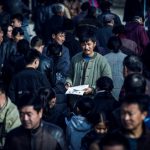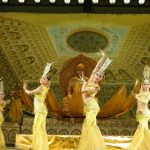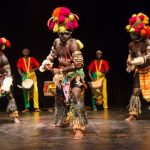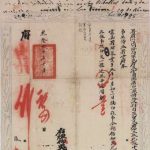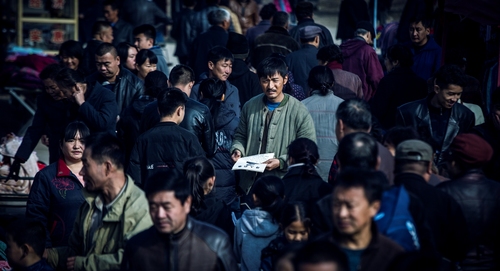 China and Portuguese-speaking Countries Film Festival
China and Portuguese-speaking Countries Film Festival
The first edition of the “Encounter in Macao – Arts and Cultural Festival between China and Portuguese-speaking Countries”, organized by the Cultural Affairs Bureau (IC, from the Portuguese acronym), will be held in July, featuring five highlights, namely the China and Portuguese-speaking Countries Film Festival, the exhibition “Chapas Sínicas – Stories of Macao in Torre do Tombo” and seminars, the China and Portuguese-speaking Countries Gala Performance, the Cultural Forum between China and Portuguese-speaking Countries and the Annual Arts Exhibition between China and Portuguese-speaking Countries. A launch ceremony was held today (19 June) at the Macao Cultural Centre, officiated by the President of the Cultural Affairs Bureau, Mok Ian Ian; the Deputy Director of the Macao Government Tourism Office, Hoi Io Meng; the Deputy Director of the Macao Post and Telecommunications Bureau, Van Mei Lin; and the Vice-Presidents of the Cultural Affairs Bureau, Kent Ieong Chi Kin and Leong Wai Man, among others.
In order to fully comply with national policies, strengthen Macao’s role as a bridge between China and Portuguese-speaking countries and highlight the charm of a multicultural city, the MSAR Government launches the “Cultural Exchange Centre between China and Portuguese-speaking countries”, using Macao as a platform to promote regular cultural exchange between China and Portuguese-speaking countries. In line with these works, this year IC holds the first edition of the “Encounter in Macao – Arts and Cultural Festival between China and Portuguese-speaking Countries” aiming to formally establish a cultural exchange and cooperation mechanism between China and Portuguese-speaking countries.
The Arts and Cultural Festival between China and Portuguese-speaking Countries, themed “Encounter in Macao”, features five highlights, including the China and Portuguese-speaking Countries Film Festival, which offers a total 23 screenings of 24 films and introduces audiences to contemporary films and masterpieces from China and Portuguese-speaking countries, as well as movies shot in Macao by Portuguese filmmakers; the exhibition “Chapas Sínicas – Stories of Macao in Torre do Tombo”, which celebrates the successful inscription of the “Chapas Sínicas” (Official Records of Macao During the Qing Dynasty (1693-1886)), jointly nominated by the Archives of Macao and the National Archive of Torre do Tombo of Portugal for UNESCO’s Memory of the World Register, also features a talk and the issue of commemorative stamps in collaboration with the Macao Post and Telecommunications Bureau, in order to share with the public some records of historical events, which though happened in Macao, are related to China and Portugal and also reflect important moments of world history; the China and Portuguese-speaking Countries Gala Performance, which invites the Gansu Performing Arts Troupe from Mainland China and art groups from eight Portuguese-speaking countries to perform in Macao and show the public the cultural and artistic development of the participating countries and regions; the Cultural Forum between China and Portuguese-speaking Countries, themed “cultural diversity”, featuring various cultural experts and scholars from Mainland China, Macao and Portuguese-speaking countries, an event that aims to offer a communication platform and to promote cultural exchange and communication between China and Portuguese-speaking countries through thematic talks, site visits and exchange seminars, among others; the “Annual Arts Exhibition between China and Portuguese-speaking Countries” presents four thematic contemporary art exhibitions, namely Alter Ego, The Universe, Penetrate and Aiya, in which MGM Cotai as special partner in Alter Ego. The event shows the development of the most representative contemporary art from Mainland China, Macao, Hong Kong, Portugal, Angola, Cape Verde, Mozambique, Brazil, Guinea-Bissau, São Tomé and Príncipe and East-Timor, holding art exhibitions in various venues and galleries in Macao and exploring exchanges between different cultures in order to allow more residents and tourists to enjoy contemporary art from China and Portuguese-speaking countries in Macao as well as showcase Macao’s characteristics as a Sino-lusophone exchange centre.
Tickets for the China and Portuguese-speaking Countries Film Festival are on sale at the Cinematheque.Passion or through the website of Cinematheque.Passion (www.cinematheque-passion.mo) at the price of MOP60. A 50% discount will be offered to students and seniors, and a 20% discount will be offered to those who purchases 10 tickets or more (20% discount is only applicable to online purchases in purchases of 10 tickets or more for the same film). Tickets for the China and Portuguese-speaking Countries Gala Performance are available at the outlets and webpage of the Macau Ticketing Network (www.macauticket.com) at the price of MOP50. The Cultural Forum between China and Portuguese-speaking Countries will be open to the public. Interested parties can register from today through tel. no. 2836 6320, during office hours. The first edition of “Encounter in Macao – Arts and Cultural Festival between China and Portuguese-speaking Countries” is supported by the Secretariat for Social Affairs and Culture and is co-organized by the Macao Government Tourism Office and the Macao Post and Telecommunications Bureau. For more information, , please refer to the respective booklet or visit the webpage www.icm.gov.mo/FCP.
View gallery

